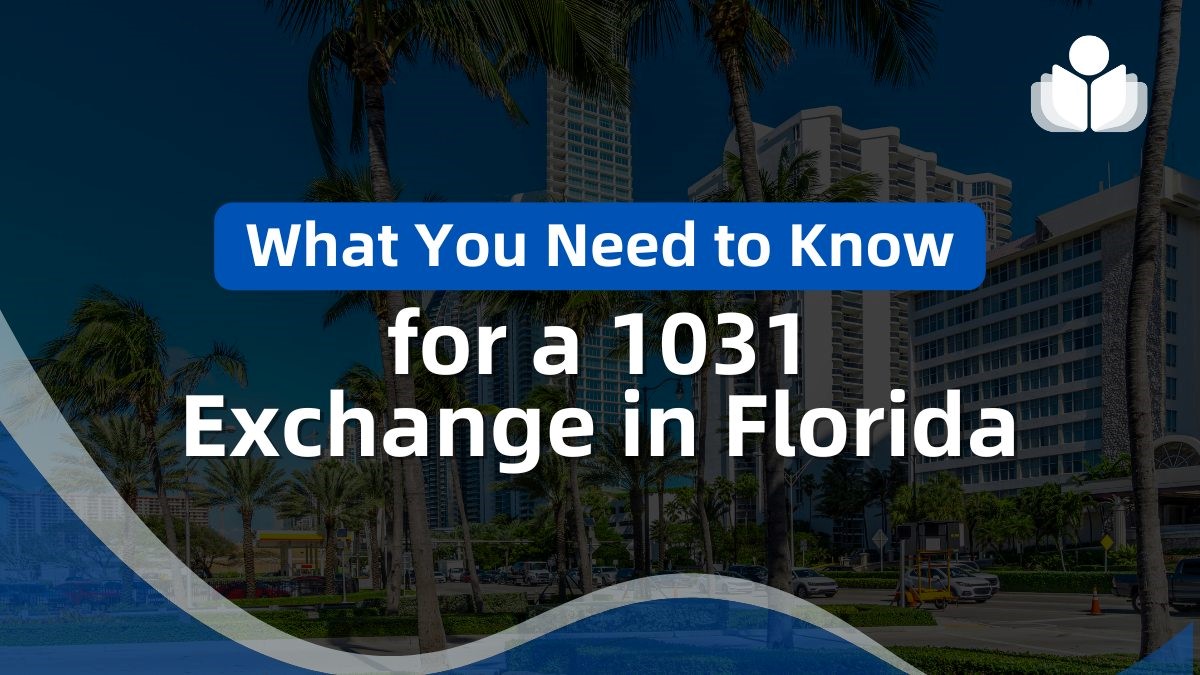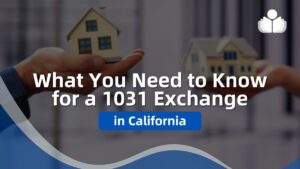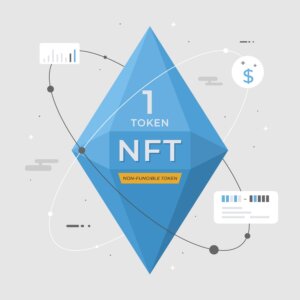A 1031 Exchange is a powerful tool that allows real estate investors to defer capital gains taxes when selling a property by reinvesting the proceeds into a like-kind property. This tax-deferral strategy is useful for those looking to grow their real estate portfolios while minimizing tax liabilities.
However, understanding state-specific considerations is crucial, especially in dynamic markets like Florida. This article provides a comprehensive guide to the unique aspects, requirements, and opportunities of conducting a 1031 Exchange in Florida, helping investors navigate the process effectively.
Understanding the Basics of a 1031 Exchange
What Is a 1031 Exchange?
A 1031 Exchange, named after Section 1031 of the IRS Code, allows investors to defer paying capital gains taxes on the sale of an investment property by reinvesting the proceeds into a similar, or “like-kind,” property.
This deferral helps investors preserve more of their capital, enabling them to leverage their investments into higher-value properties or diversify their portfolios without an immediate tax burden.
How It Works
The process of a 1031 Exchange involves several key steps. First, the investor sells the relinquished property, but instead of receiving the proceeds directly, a Qualified Intermediary (QI) holds the funds.
The investor then has 45 days to identify potential replacement properties and 180 days to close on the purchase of the replacement property. The replacement property must be of like-kind, meaning it must be similar in nature or character to the property sold and used for investment or business purposes.
Eligibility Requirements
To qualify for a 1031 Exchange, several criteria must be met:
- Like-Kind Property: Both the relinquished and replacement properties must be of like-kind, typically meaning they’re used for investment or business purposes. This broad definition allows for a wide range of property types to qualify, from commercial buildings to vacant land.
- Investment or Business Use: The properties involved must be held for productive use in a trade, business, or investment, not for personal use.
- Qualified Intermediary: A QI must facilitate the exchange. The QI ensures that the investor does not take constructive receipt of the sale proceeds, which would disqualify the exchange.
Specific Considerations for 1031 Exchanges in Florida
Real Estate Market Dynamics
Florida’s real estate market is known for its growth, driven by factors like population influx, tourism, and favorable tax policies. Areas such as Miami, Orlando, and Tampa are seeing rapid appreciation, making them attractive for 1031 Exchanges. Investors should consider market trends and future appreciation potential when selecting properties to maximize the benefits of the exchange.
Property Types
Common types of properties in Florida suitable for 1031 Exchanges include vacation rentals, multifamily units, and commercial properties. The state’s thriving tourism industry makes vacation rentals particularly lucrative, while multifamily units and commercial properties offer stable income streams. Choosing the right property type is essential for aligning with investment goals and meeting the like-kind requirement.
Impact of Local Regulations
Local zoning laws and environmental regulations can significantly impact a 1031 Exchange in Florida. Coastal properties, for example, may be subject to stricter building codes and environmental protections. Understanding these regulations is crucial for ensuring the chosen properties comply with all local laws, which can influence the feasibility and success of the exchange.
Hurricane and Flood Zones
Florida’s vulnerability to hurricanes and flooding necessitates careful consideration when selecting properties. Properties located in hurricane or flood zones may require higher insurance premiums, affecting overall investment costs and property values. Investors should assess these risks and factor in potential insurance and maintenance costs when planning a 1031 Exchange in Florida.
The Process of Completing a 1031 Exchange in Florida
Step 1: Selecting the Right Property
Choosing the right properties for a 1031 Exchange in Florida involves considering both current market conditions and long-term appreciation potential. Investors should look for areas with strong growth prospects, such as Miami, Tampa, or Orlando, and consider factors like property type, location, and market trends to maximize returns.
Step 2: Engaging a Qualified Intermediary
A Qualified Intermediary (QI) plays a critical role in the 1031 Exchange process by holding the sale proceeds and facilitating the exchange. In Florida, it’s important to select a QI with a deep understanding of the state’s real estate market and specific legal requirements. The QI ensures that the transaction complies with IRS rules and manages the timeline to prevent disqualification.
Step 3: Identification of Replacement Property
The 45-day identification period requires investors to identify potential replacement properties quickly. In Florida’s competitive real estate market, it’s advisable to start the search for replacement properties early. Investors may identify up to three properties, or more under certain conditions, to ensure they have viable options that meet the IRS’s like-kind criteria.
Step 4: Closing the Exchange
Closing the sale of the relinquished property and acquiring the replacement property must be completed within 180 days. This step involves coordinating with the QI, real estate agents, and legal professionals to ensure that all documents are in order and the transactions are executed on time. Delays can jeopardize the exchange, so managing the timeline carefully is crucial.
Step 5: Compliance with Federal and State Filing Requirements
After completing the exchange, investors must file IRS Form 8824 to report the transaction and defer the capital gains taxes. In Florida, while there’s no state income tax, compliance with local tax and regulatory requirements is still necessary. Investors should ensure all relevant documentation is filed accurately to avoid penalties and maintain the tax-deferral benefits of the 1031 Exchange.
Tax Implications of a 1031 Exchange in Florida
No State Income Tax
One of the most attractive aspects of conducting a 1031 Exchange in Florida is the state’s lack of a state income tax. This means that investors can defer capital gains taxes at the federal level without worrying about additional state income tax obligations. This absence of state income tax enhances the financial appeal of investing in Florida properties, making it a popular destination for real estate investors seeking to maximize their returns.
Capital Gains Tax Deferral
A 1031 Exchange allows investors to defer paying federal capital gains taxes on the sale of an investment property by reinvesting the proceeds into a like-kind property. This deferral is advantageous in Florida, where rising property values can lead to significant capital gains.
By using a 1031 Exchange, investors can leverage their gains into more valuable properties or diversify their portfolios without an immediate tax burden, increasing their investment potential.
Homestead Exemption Considerations
Florida’s homestead exemption provides significant property tax benefits for primary residences, including protection from certain creditors and reductions in assessed property values. However, if a property that was previously a primary residence is converted into an investment property and used in a 1031 Exchange, the homestead exemption may no longer apply.
Investors must carefully consider how the loss of this exemption could impact their long-term tax liabilities and property value.
Depreciation Recapture
At the federal level, depreciation recapture is an important consideration in a 1031 Exchange. When a property is sold, the IRS requires that any depreciation claimed on the property over the years be “recaptured” and taxed as ordinary income, up to a maximum of 25%. While the 1031 Exchange allows for the deferral of capital gains taxes, it does not eliminate depreciation recapture.
Investors should know this potential tax obligation when planning their exchanges, particularly for older properties with significant depreciation.
Legal and Compliance Issues Specific to Florida
Real Estate Law Compliance
Florida has unique real estate laws that must be followed when conducting a 1031 Exchange. These include strict property disclosure requirements, tenant rights under state law, and various environmental regulations. For instance, sellers are required to disclose known material defects that could affect the property’s value, which can be particularly relevant in a 1031 Exchange where both the relinquished and replacement properties must meet specific criteria.
Coastal and Environmental Regulations
Given Florida’s extensive coastline, properties near the coast are subject to additional environmental regulations, including Coastal Construction Control Lines (CCCL) and other state protections. These regulations can restrict development and affect property values, making it essential for investors to understand how these rules might impact the eligibility of coastal properties for a 1031 Exchange.
Legal Challenges
Legal challenges, such as disputes over property conditions, easements, or title issues, can arise during a 1031 Exchange in Florida. These issues can delay or even derail the exchange process, leading to potential financial losses. To mitigate these risks, it’s crucial to conduct thorough due diligence, including title searches and property inspections, before proceeding with the exchange.
Consulting Local Experts
Navigating Florida’s complex legal landscape requires the expertise of local professionals. Working with Florida-based real estate attorneys, CPAs, and other specialists ensures that all legal and compliance issues are addressed correctly. These experts can provide guidance on state-specific regulations, help resolve potential legal challenges, and ensure that the 1031 Exchange is completed in full compliance with both federal and state laws.
Benefits and Challenges of 1031 Exchanges in Florida
Benefits
Conducting a 1031 Exchange in Florida offers several key advantages. The state’s favorable tax environment, including the absence of state income tax, allows investors to maximize their capital gains deferral benefits. Florida’s growing population and robust real estate market also offer strong potential for property appreciation, making it an ideal location for reinvesting exchange proceeds.
The state’s diverse property market, from vacation rentals to commercial real estate, provides many opportunities for portfolio diversification.
Challenges
However, there are challenges to consider. Finding suitable replacement properties in high-demand areas like Miami or Orlando can be difficult, particularly given the state’s competitive real estate market.
Seasonal market fluctuations, driven by tourism and migration trends, can also impact property availability and pricing. Investors must be prepared to navigate these market dynamics while adhering to the strict timelines imposed by the IRS for completing a 1031 Exchange.
Market Volatility
Florida’s real estate market is influenced by factors such as tourism, seasonal population shifts, and migration trends, leading to potential volatility. While this volatility can create opportunities for substantial gains, it also poses risks for timing and completing a 1031 Exchange. Investors need to carefully monitor market conditions and be ready to act quickly to secure desirable replacement properties, ensuring a successful exchange.
Alternatives to 1031 Exchanges in Florida
Opportunity Zones
Investing in Opportunity Zones is a compelling alternative to a 1031 Exchange in Florida. These designated areas offer significant tax benefits, including deferral and potential elimination of capital gains taxes, for investors who reinvest their gains into Qualified Opportunity Funds. Florida has several Opportunity Zones, particularly in growing urban areas like Miami and Orlando, making it an attractive option for long-term investment and community development.
Installment Sales
An installment sale allows property sellers to spread out capital gains taxes over several years by receiving the sale proceeds in installments. This method reduces the immediate tax burden and can be particularly beneficial in Florida’s real estate market, where property values are high and capital gains can be substantial. Installment sales provide flexibility in managing tax obligations while still realizing gains from a property sale.
Deferred Sales Trusts
A Deferred Sales Trust (DST) offers another way to defer capital gains taxes without using a 1031 Exchange. In a DST, the property is sold to a trust in exchange for a promissory note, allowing the seller to defer taxes as they receive payments from the trust over time. This strategy is useful for Florida investors looking to diversify their investments or move out of real estate while still managing their tax liabilities.
Direct Sale With Reinvestment
In some cases, simply selling a property and reinvesting the proceeds elsewhere might be the best strategy, especially considering Florida’s lack of state income tax. Investors can take advantage of Florida’s favorable tax environment and the state’s diverse real estate market to reinvest in other opportunities without the complexities of a 1031 Exchange.
FAQs: What You Need to Know for a 1031 Exchange in Florida
Conclusion
Conducting a 1031 Exchange in Florida offers significant tax deferral benefits, but it also comes with unique challenges, such as finding suitable properties and navigating local regulations. Thorough planning and understanding of Florida’s specific legal landscape are crucial for a successful exchange.
Evaluating all available options, including alternatives like Opportunity Zones and Deferred Sales Trusts, can help investors make informed decisions and optimize their real estate investments in Florida.
 Sections of this topic
Sections of this topic
















